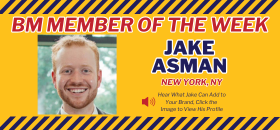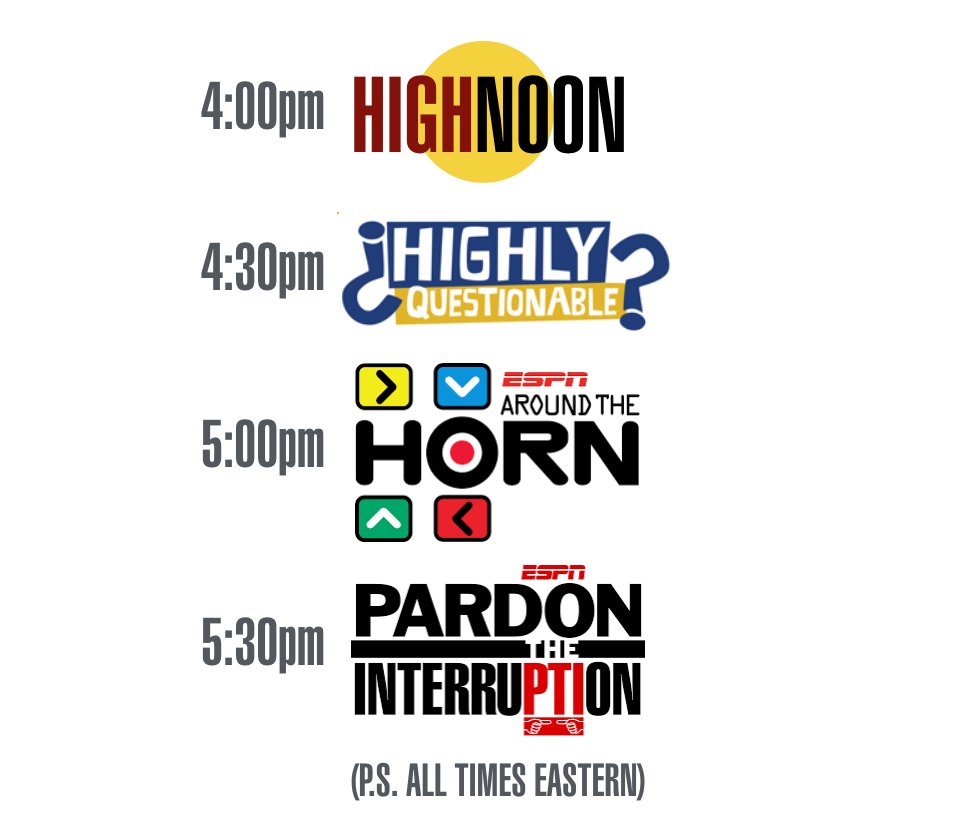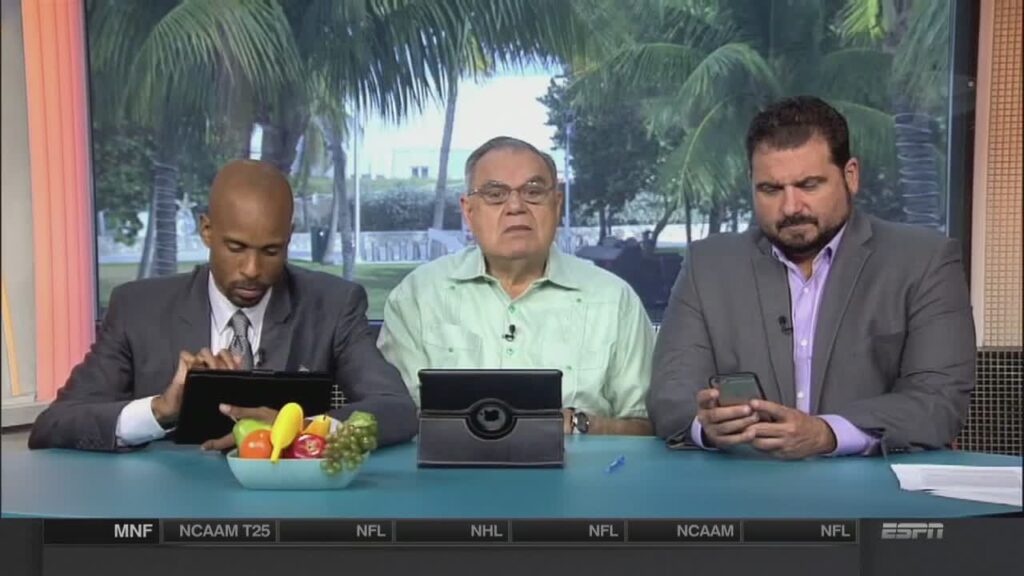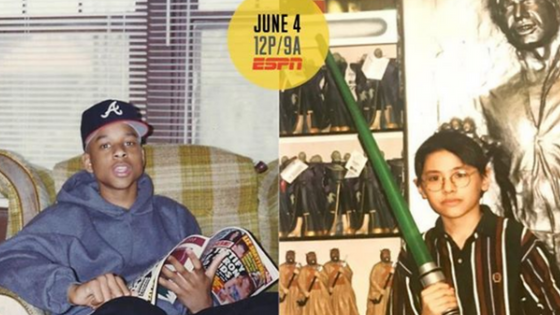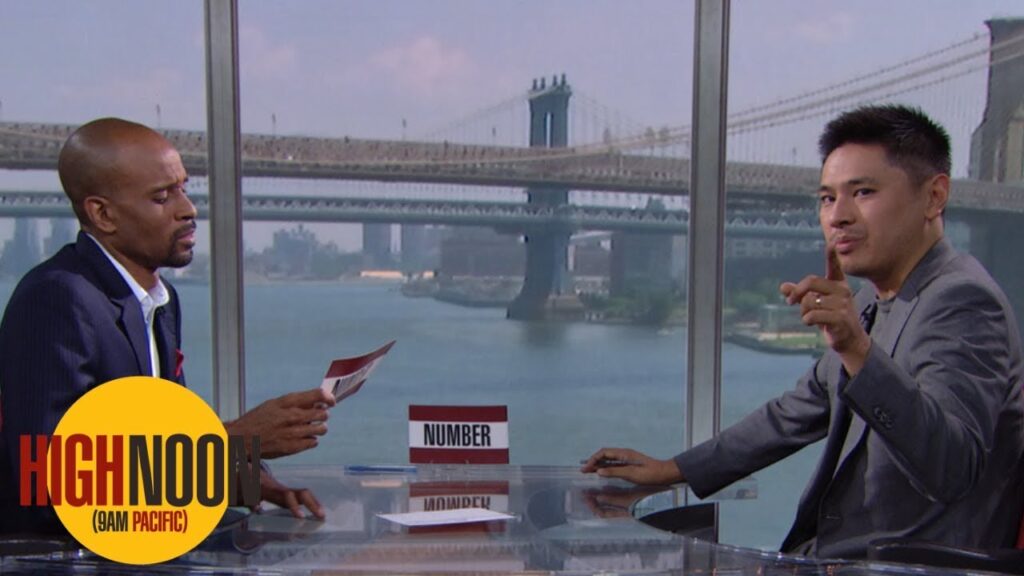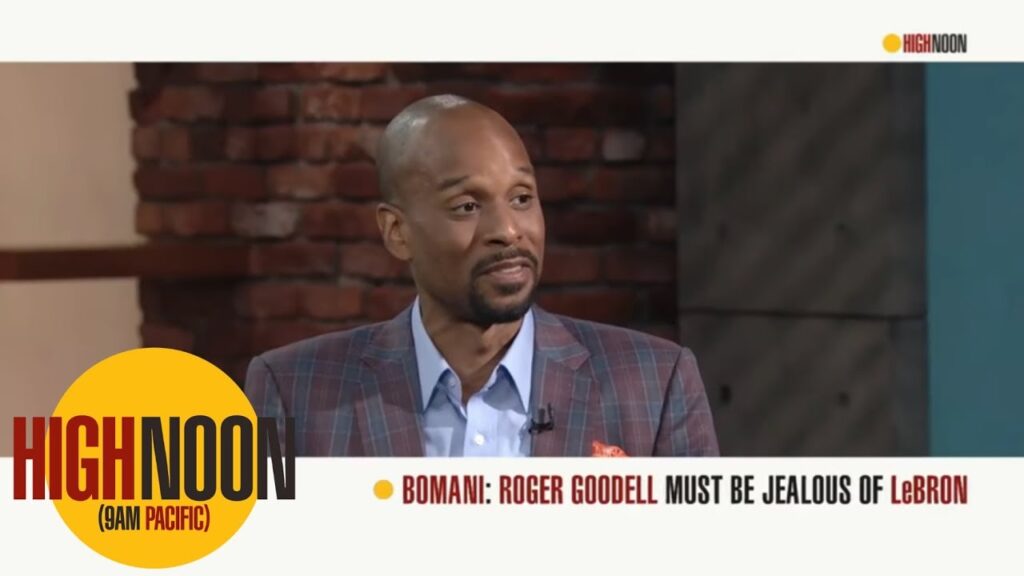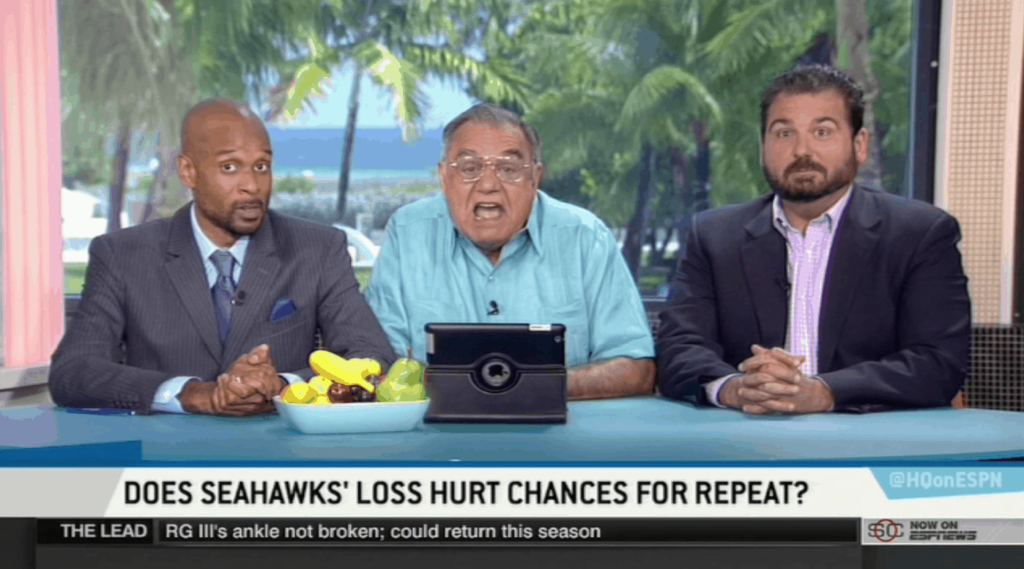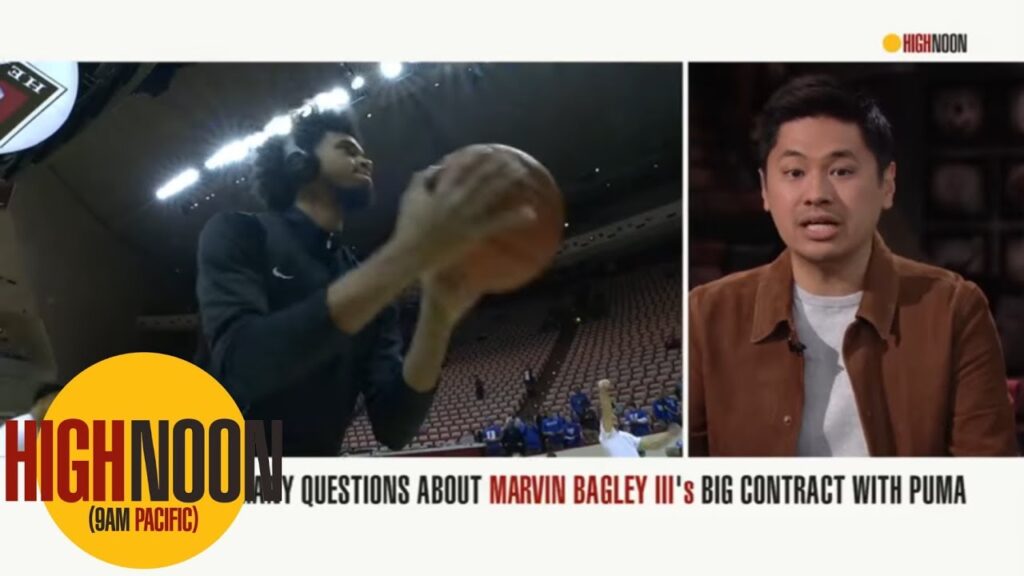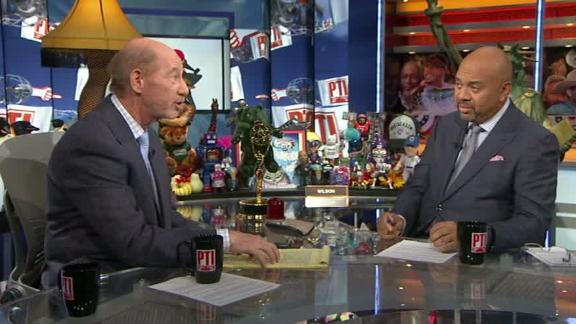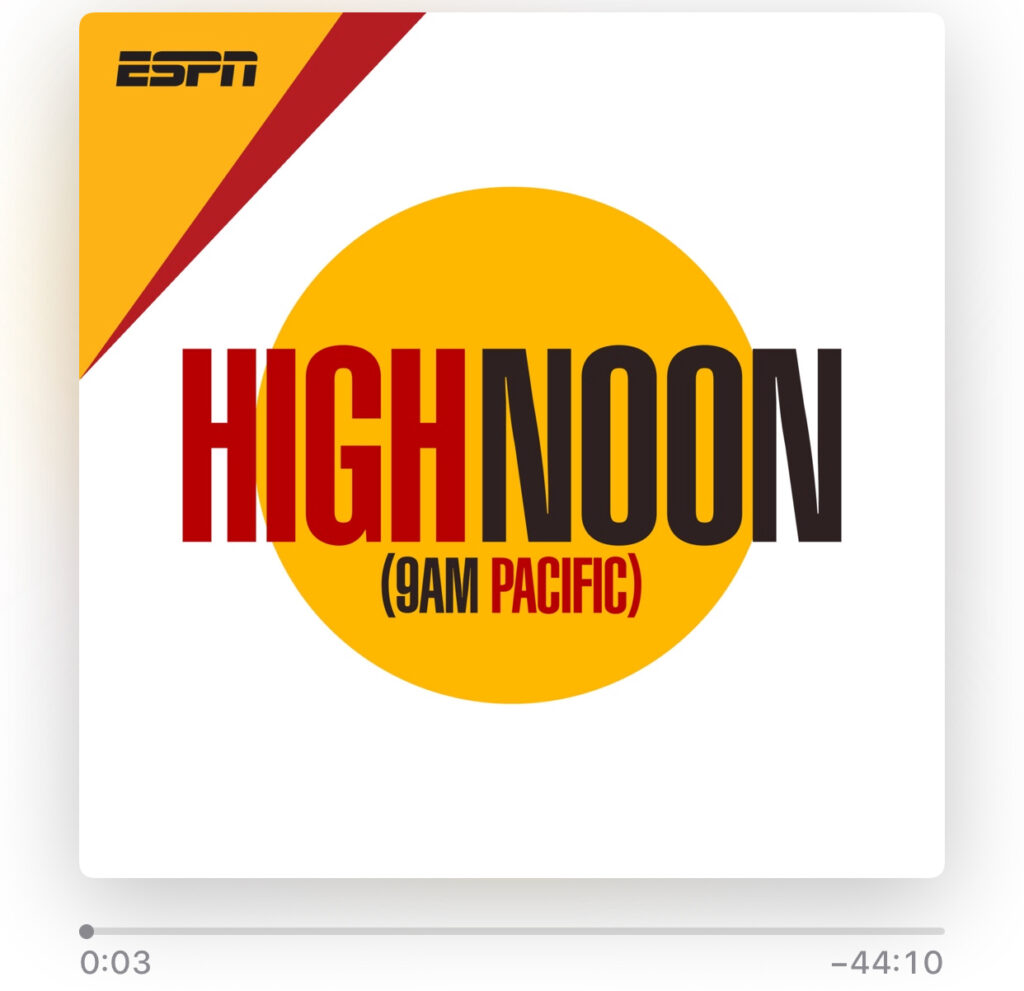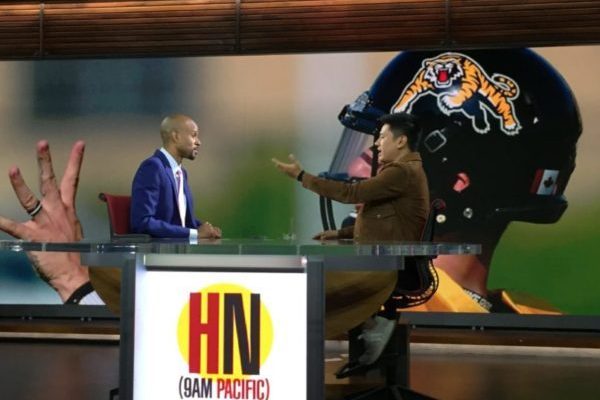Bomani Jones and Pablo Torre relaunched one of the most unique shows on ESPN earlier this week. After debuting to critical acclaim (including my own) back in June, High Noon moved from noon to 4pm. The show also went from one hour to a thirty-minute run time.
That second part has been the source of much speculation by people in the sports media. Did ESPN see a problem with the show? Is this step one on the road to an early cancellation?
Well, the answer to questions stemming from part 2 are probably answered by part 1. ESPN isn’t moving High Noon to a more viewed time slot if the network were preparing to cancel the show. Also, there is no real way to judge the show’s mass appeal to date.
High Noon was launched in June with no promotion outside of a social media campaign targeted at people that are already fans of the hosts. It’s smart to inform the people that will be your core, but they were hardly the ones that needed any selling. If we’re being fair to High Noon, we’ll start judging its performance now that the show is in more prime programming real estate, kicking off ESPN’s afternoon block which also includes Highly Questionable, Around the Horn, and Pardon the Interruption.
I went to New York to meet with Pablo and Bomani, who I have known for the better part of 12 years, at ESPN’s new South Street Seaport studios. We talked about the show, its naysayers, how they learned to have conversations on TV, and a show all three of us liked, but only two of us have been on (HINT: I am not one of those two), Desus and Mero.
D: Is the story that I have heard true where ESPN asked each of you who you would want to do a show with independently of each other and you both named the other?
B: Close enough.
P: I think so. I actually don’t really remember the true moment that this was broached, but it was something I wanted. As someone without a show at the time, with the number one pick in the fantasy draft I would have taken Bo. That was my thought. I am not sure when I communicated that to someone, but that is how I felt for a while.
D: And what was the pitch of the show or what was it about this show that made you, Bomani, say “Okay, I am leaving Highly Questionable and I am leaving Miami. This is the path forward”?
B: I needed to leave Highly Questionable. I had done it for four years. I signed a four-year contract to do that in the beginning and that was over. It was time for me to do something else. It was really good while I was doing it. It’s not like it went sour. It was just time for me to do something else.
At least for me, in trying to figure out who I could work well with – that’s the difficult thing. I do radio by myself. You can’t do television by yourself. That would be incredibly difficult. It was about who fit the sensibilities I had and who could keep up with the places I might want to go from time to time. I don’t even think I had a number two, to be honest.
D: You mention how you do radio, and I’ve always thought you were really good in the way you can bounce from one sport to another and then maybe off sports entirely before bringing it back to the sport we started on. It seems like that has translated really well so far for this show, and I wonder if that is where some of the pushback has come from people that say this isn’t the ESPN they know or this isn’t what sports media is supposed to be.
B: The problem with that is I don’t have any evidence that the people with the harshest public push back on this show have ever really watched it.
P: Yes!
B: So I don’t know if there is any factual basis. Maybe that is all there followers need.
As for the show though, we may meander, but it’s rare we’re going off of sports. We may meander a bit in the way the sports are described, but I do sports shows. I have always done sports shows. I can go do other stuff other places. I don’t have to do that here.
P: I think one of the things I have enjoyed about our show, is I would say people that have done any sort of quantitative analysis will find that we have “stuck to sports” overwhelmingly, but what we have been doing is interjecting about ourselves. There’s a lot of our life in the show, and that’s not so much politics or social issues or…
D: Right. It’s like the build up to the show with the campaign you did on social media with pictures of y’all as kids.
P: Precisely. It’s about getting to know us as people and the three-dimensionality of Bomani and me. That is what is new to me. Bo has been doing a three hour radio show forever that is so die-hard sports, and I have 400 episodes of Around the Horn under my belt, which are right down the middle and in the sports wheelhouse, but within that context are where we can have fun.
D: Does Clay Travis calling High Noon “Woke Center” bother you at all?
B: No. I mean, what else would I expect to happen? I have a general frustration with some of that ilk of pushback, because it has no factual basis.
P: They’re professional trolls, and so I strive to deaden my senses to that. I know a criticism like that doesn’t come from a place of evaluation or honesty. I don’t care, but if you watch our show and say “I don’t like this specific thing,” I will absolutely listen to a critique. We just don’t get that.
B: Yeah. He is absolutely allowed to feel the way he feels. I want to be absolutely clear about that. Where it gets to be weird to me is I have been doing this for a long time now.
I did local radio in North Carolina. I did that satellite show for a Canadian company. I can’t say the audience was primarily Canadian, but those were the people that called me up. I played just fine with these people in these places. We can go back and listen to some of the voicemails from these places in 2008, keeping in mind that 2008-2009 was the summer of Obama.
We can listen to some of the people that were calling up and listening. I am just not convinced that all of “those people” have such a huge problem with what it is we do. I don’t believe that. I think they are fully capable of enjoying what we do. I think there are some cynical people that approach those folks with assumption that they can’t and then feed them these things from there.
I guess if you decide that’s what your hustle’s gonna be, that’s the decision you’re going to ultimately make. I think with those people though, we’re going to be just fine, because we do good work.
P: I would also point out that we’ve done…how many shows since June 4? And how many headlines have been generated from us crossing some sort of line? None, because if you watch the show, you see that we are doing good shows and staying squarely within the mandate given to us by a sports television company.
If you really think there is anything Woke Center-y about it, as much as I resist that term for its lack of cleverness, where is the meat on the bone? Give me something! There is no critique. I’m happy to listen if you’ll give me that.
D: When I wrote that piece about the first show and active listening, you (Pablo) reached out to me on Twitter. You (Bomani) sent me a text. Your producer reached out to me on Twitter. Everyone said the same thing, that that was going to be a goal of the show.
What were the conversations like where you are talking about not what will be said on the show, but about how you’ll hear it.
B: There’s a big difference between this show and any other show. It’s you’re on the screen at all times.
D: Is that intimidating at all?
B: No. It takes some getting used to. I also had that do a degree with Highly Questionable. It’s a two-camera shoot. It’s always down-barrel.
I used to get hell all the time from people about not paying attention during the interviews. It’s not that I wasn’t paying attention. I was absolutely the sidekick on the interviews. I was sitting there looking for an opening to say something. If time was tight, there may be a whole interview where I only ask 2 questions. That’s what the role was.
It did make me kind of attuned to the fact that people are going to be reading your face as you go. Now, my face goes in all kinds of directions, so I have to turn it on or turn it off. With this show it was “okay, ride with it.” You go with whatever the direction is because that’s going to be a big part of this. It’s going to be on the screen.
I didn’t really even have a full grasp on it until a little bit of doing this. I saw the effect it has on screen as the other person is saying and doing things. Then it becomes a great device for us, at least personally for me, because (Pablo) says enough absurd shit that allows me to put this face on the road.
P: Yes! We want that. I will speak for Erik (Rydholm, High Noon’s creator and producer) as well. We want Bomani’s faces. We want that expression to come through.
There’s two things I think to active listening. There’s the performance of listening, which is what Bo is talking about. It’s the theater of listening. Look at Stephen A (Smith) and Max (Kellerman) and Skip (Bayless). That’s what those guys are all really good at. The other part is really listening, which is different.
I would come in and had prepared all of these notes. They would be printed out and I would think “These are my bullet points. Worst case scenario I can fall back on these.” Tony Kornheiser has a long-form legal pad with handwritten notes. I learned from him. That’s his deal. Bo has instilled in me the desire to not use notes so I can just follow the conversation wherever it goes.
D: Was part of the problem with bringing notes that you would react to what he said with “That reminds me *flip, flip flip*”?
P: I just had things I wanted to hit. Around the Horn and other shows I do is so formatted and those beats and the timing are so important. Whereas our show wants to be free flowing and follow those digressions you mentioned.
So, if he says something that is interesting and not what I anticipated, I am more likely to follow that and play on that. That is how we get to these spontaneous and cool conversations and moments.
B: Plus, you don’t always hear what is said. That’s a natural thing with anybody in a situation like that. If you’re thinking about what you are going to say, that is a dominant activity that makes it difficult to keep up with everything that is going on, and you can mess around and say something that has already been said.
It’s a matter of he don’t need notes to talk to me on a regular basis, so I don’t think he need no notes to talk to me here.
P: And that is absolutely right. I have no good answer to that. It was a crutch ultimately.
In other formats it makes sense. I totally respect it, but with this…
B: That’s the thing. We’re both coming from television formats that don’t require a whole lot of interacting with anybody else. I got into this doing a lot of Outside the Lines and Around the Horn. Even with Highly Questionable. You never look side-to-side. Highly Questionable is always looking straight forward.
It’s like baseball in that sense. In baseball you never pass the ball to each other. You swing. I swing. That’s how it goes.
This is much more back-and-forth. This is all back-and-forth. It’s a much different interaction, and you have to learn to do that. That’s a process that I am certainly going through and trying to figure out.
D: That’s funny to talk about Around the Horn as not being really interactive, because I think about my favorite clip from Around the Horn and I think it was one of those outtakes that made its way to YouTube.
I think both of you were in it, but Bo, I know you were featured more prominently. It’s the clip where you are shouting at Bill Plaschke for liking Church’s Fried Chicken. As interactive as that clip seems, you’re right. Bill is in LA. You were in Miami. Everyone is just looking into a camera.
B: There’s another difference too with Around the Horn. I did that show for eight years, which is crazy to look back on.
I didn’t know any of those people. I knew JA Adande and I knew Michael Smith, but I didn’t know anybody else. I didn’t grow up on the beat or on the road around those people. Pablo, when you started you at least knew like Bob Ryan, right?
P: Yeah, through various reporting things and The Sports Reporters I had encountered a couple of them.
B: Right. And see, when I started doing Highly Questionable, I didn’t even know Dan (Le Batard). The math is not exact, but I have basically known Dan as long as I have known Pablo. The difference is I started doing a TV show with Dan on day 1. I started doing a TV show with Pablo five years later.
I don’t know how many people are on TV now, Jemele and Michael would have fit this example, but I don’t know how many people are doing a show with someone they have been cool with for a long time.
P: Well, PTI.
D: That was the only one I can think of.
B: Even then though, with PTI, those guys are really cool with each other, but it was born from working in the same place. That is different from how we’re cool with each other. That we work in the same place is how we know each other, but that’s not the basis for the relationship. That is different than anybody else that has a show.
D: Are there different elements of PTI and then the “Embrace Debate” era of ESPN shows that laid the ground work for a show like High Noon to exist?
P: Well, we have the producer that made those shows.
B: He made PTI. We can’t give him First Take.
P: Right. Bill Wolf, whose office we are sitting in, gets credit for Around the Horn.
B: I would make the argument that our show is more First Take. There may not be as much argumentative interaction, but our show is more First Take than PTI, at least in the hour format. It gave us the breadth of the topics and we had the time to dive in. PTI is much more specifically formatted.
See, I like the format of PTI, and we try to incorporate some of that in ways that we can into the show. The features are simple but they’re cool. They’re simple but they’re fun. First Take doesn’t have anything like our “Names, Lines, and Numbers” segment. PTI is much more like that.
P: As we go to the thirty-minute format, a lesson we will take from PTI is how to handle variety and also give us time on topics. So, for instance, PTI’s “Big Finish” goes “bop bop bop bop bop bop bop”. We’re not going to do that.
We’re going to give ourselves time to breathe because of everything we just said about the relationship and the following of digressions. Our mandate for the thirty-minute format is to learn the lessons of PTI while also being ourselves.
As much as I love PTI and regard it as the gold standard, we are trying to do something that is true to us.
B: Right. The other thing I would say is all those guys in the production room worked on Highly Questionable. I did Highly Questionable for four years. The liberating thing about that show and the most important thing I picked up was the importance of demonstrating to the audience that you are having a good time.
HQ was a good time. When I stopped doing that show…There was about a year between me leaving Highly Questionable and starting this show. There was a noticeable effect on my life in that I had lost five days a week of fun and replaced it with nothing.
What we are doing here is having fun and we’re trying to put that on the screen as much as possible. We’ve been doing this now for what? Like 3 months? Has there been a bad day?
P: No.
B: No one has come in with an attitude or had people talking like “hey, we gotta play it easy with this person”. I can’t think of a time or a day where there isn’t laughing throughout this.
P: And we understand each other. So when there are moments of tension on screen, we know at the end of the day that we are cool. Part of the fun of the TV show is you get to be a heightened version of yourself, but ultimately we know we’re cool and we’re going to land in the same place.
That means usually there are no bad days. That’s the accessibility of it. Our bet is if you see us on screen having fun, you would like to join in on that.
D: You guys haven’t done a guest or brought in a third voice on any shows, right?
P: Yes. Right.
D: I am not faulting any shows that do add a third voice or bring in a new voice from time to time, but that is probably a tribute to your chemistry that you can keep this thing rolling and stay entertaining without having to do that.
B: I don’t think that our show, particularly in the half hour format is conducive to bringing in our guest. I mean, I think there are people that would be really good. (Dominique) Foxworth would be good.
P: Yeah. Mina (Kimes). I mean there is a roster of people that we like and respect.
B: Right, but this show isn’t built to have someone come in and give you a draft breakdown. That’s not really the way that we are doing this as of right now. That is a bit different than the way the other shows on the network are formatted.
D: Was it last week you had Spencer Hall on your podcast to talk college football?
B: Yes.
D: Right, so you and Spencer clearly get along and he seems like a guy that can roll, but bringing him in would be doing a very different thing than what makes High Noon worth watching.
P: I think if we were going to do a guest segment, we would have done it in our hour-long format where the D-block was “This Blank Story”. It was a four minute piece on one thing. That theoretically could have been a guest, but we just enjoyed getting deep into stuff.
Our challenge and our task is how do you bring that into a thirty minute show. Maybe we’ll bring it back for certain times when it is called for, but our inclination is to just talk to each other more. That’s what’s entertaining…to me at least.
D: So when you find out you’re moving to 4pm and the show is going to thirty minutes, was there a panic at all because of what you had built, or…well, what do you feel about it?
B: I used to work the noon shift. Now I work at 4. By and large it wasn’t a signal from the company about anything negative.
P: It was the opposite actually.
B: Right, but even if it wasn’t, what am I going to say? “No I’m not”?
The way I keep describing the move is if they had said in the beginning of this whole process all of the things they had said in the lead up to giving us our own show and then instead of saying “it will air from noon until one” they said “it will air from 4 to 4:30,” who is saying no? Nobody is saying no! It’s not a change in that way.
P: The other thing there is a fundamental misunderstanding of the way linear television works. That 4pm time slot is really good. Just on the facts, right? That is a good place to be.
To me, this is where we would have wanted to go eventually: deeper into the schedule, closer to PTI, all that linear TV stuff. So the thirty minute thing, I will miss the hour, but all of the shows I respect the most are PTI, Around the Horn, and HQ.
D: They’re all 30 minute shows.
P: Right. I can’t be insulted by that.
B: I’ll tell you this too. We did a thirty-minute rehearsal the other day and Wooo! I enjoyed that a lot more than doing an hour.
P: There is a lot of fun to be had in thirty minutes.
D: I never understood the narrative that this was ESPN panicking over the show. Like you said, the biggest shows are all thirty minutes.
B: Well, I think that if you are not particularly informed about the way this business operates, this starts and then there is a change. I would understand why someone who is not informed with how this business operates would perceive that a change in the way this operates is the result of a problem with the way this thing currently exists.
I don’t blame the people who don’t know anything about the business for saying that. I do blame people who purport to know something about the business and then say that. That is the difference.
P: And by the way, there are plenty of “viewers” that consume the show as a podcast. Let’s say you are one off those people that listens to us and loves us at an hour. You’re going to miss those extra thirty minutes.
God bless that person. I love that person. That is exactly how I want you to feel. But we’re going to prove that you will also love us in this format.
That’s the only demographic that I truly care about is the person that loves us and is now getting less of us on a daily basis.
B: Look, it’s going to be, in some ways, a different show just by nature of the time constraint. We’re going to have to be a little punchier. We’re going to have to get to the point a little quicker with opinions that are a little bit stronger.
We’re going to have the challenge of going back and rereading our initial press release. Some of the adjectives we use and things we said we want the show to be, we still want the show to be in this format, but like I said before, what are we saying? “How dare you demote us to the status of struggling programs like Pardon the Interruption”?
P: Right, and now our lead in is The Jump. We are the lead in to Highly Questionable. To me, if there was any problem, the network probably isn’t putting us in that slot. Why would you give us better real estate if there is a problem.
B: Also, given the way our industry is covered by people, if there was a problem with our show, you’d have heard about it by now, or at the very least we would have been told.
P: Again, where is the meat on the bone?
B: And to be fair, I don’t even think there are a lot of people that have tried to make that argument. I think that is something that people said for like a day and then went on about. Look, we’ve been doing this show for 2 or 3 months. There are a lot of people that don’t even know this show exists yet.
That has nothing to do with us. Anybody that has ever tried to get a show up off the ground knows there’s a day where people just turn it on and “yo, there’s this thing here” and they don’t know what it is. They just react to the presence of the thing.
Then maybe a couple of days later they come back and they leave the thing on. But first they have to find the thing, because there are a lot of people right now that are going to turn on their TVs at 4pm on September 11 and don’t know what the thing is.
D: I hadn’t even thought of the people that will turn on their TVs on September 11 and to them there is this new show with Bomani and Pablo on.
P: And the odds are there will be more of those people than there were for the previous slot.
B: This show didn’t get a massive PR campaign. You can talk about seeing that stuff on Twitter, but what’s the reach right?
P: That’s our audience already.
B: There was no television campaign that was pushed. There are going to be people from now until next Septmeber asking friends “Do you know what this new show is?”. I have people stop me on the street still and tell me “I love Highly Questionable. I watch it all the time.” Well, I haven’t been on there in a year and a half.
D: What has the prep been like in changing over from an hour to thirty minutes?
B: It’s the same thing with less topics.
P: Yeah.
D: So that’s going to be the strategy?
B: Well, here’s what I’ll say and you tell me if I am wrong here. I don’t think our prep, especially the night-before-prep isn’t that different.
We’ve got a Google Doc. Ryan and those guys put topics in the Google Doc. We add our comments to those topics. We get here and it’s been arranged into the place they want it to be.
What I feel like is happening now is it’s the same number of things that it was before. It’s just in the end, there are only half of them.
P: Before, with an hour, we could wander around more. Some of my favorite things are things I did not anticipate, because of the active listening that we talked about earlier.
Now we have to make sure that if we have the sense that something is going to be really good, we have to elevate it and make sure it makes the thirty-minute version. That’s something we’re going to have to feel out. It’s not going to be perfect, but the big difference is we have to make sure we’re getting the cream of the crop. Let’s just make sure we’re getting the cream and not just the dutiful “here are the biggest stories.”
B: Filling an hour is a monster, right?
P: Right. We were doing 18-20 topics per day.
B: Yeah. I’m used to programming the radio show.
D: Right, where you can come back to the same three or four topics in a day.
B: Sure, you can come back, but you still have to fill three or four hours. The question for me becomes “do I have 11 minutes in me?”
In the hour format the question we were always asking was “do we have 2 and a half minutes?”. See, with television you don’t have to go as deep, because you go quickly, but you do have to do more of them.
It’s a lot easier to do this on that thirty-minute show than it was on a one hour show. There would be times on that one hour show where every now and then we’re looking around offscreen like “Yo ma, which one of y’all got that bell? Where’s the bell? Why haven’t I heard a bell?”.
P: I have definitely called for the bell. By the way, it works great on TV as a device, but our task is to make sure we are hitting our marks more than before.
D: So having at most two-and-a-half minutes a topic, with Bo coming from radio and both of you having a background in print, did you know how to do that or did you have to learn by failing? Were you instantly ready for the difference between preparing a topic for TV vs. preparing a topic for a different medium?
P: I would say I got my graduate degree in substitute hosting. I have been a guest host everywhere, so I got to try out various versions of what my two-and-a-half minutes would look like. I would say that it is easier for me know absolutely.
Going back to the longhand written notes. It’s word economy. I would say doing Around the Horn is more stressful than doing our show, because I have x amount of time, and I want to make these points, and I may or may not get the ball back. I may or may not get muted. There are so many more variables.
With this, because we have that established relationship, I wasn’t wrong-footed by that in the same way. Going into this show I had enough preparation for how long I wanted to say things, and how I wanted to say them. Obviously I am not a finished product. I am still feeling it out, but there’s very little terror in me in terms of that.
D: There’s less of a desire to say or think “and let me add this…” when you’re turn is over.
P: Right. We’re having conversations about when to get out on things in the thirty-minute format. Before, with an hour we would just sort of talk into a fade-out. Now we have discussions on how to wrap and when to obey that bell.
B: The trick is knowing whether what you’re saying is worth hearing. We’ve all done that where we start down a topic and in your head you realize “No. That’s not it.”
For me, that is where HQ was really helpful. Knowing that you’ve got an out. Somebody says something and BOOM! We stop right there. Because while you’re listening to hear if there is an out, you also have to be listening to hear if there is not an out.
With HQ it probably took us a year or a year and a half to get to the point, well, at least for me, to get to the point of knowing “Nope. We didn’t need to put anything in there. I didn’t need to say anything more.”
D: Doing HQ during the same time you’re doing the radio show, or doing the podcast as you’re preparing for this show, do wires ever cross in your head at all?
B: Not really, but I also have faith in the producers. If I need to stop talking, they will tell me. If we need to move on, they will let it be known. You know? Let them do their jobs too.
D: So what is it like working here with this view and in this new studio?
B: The big thing for me is working with people. I’ve never worked in an office in this way before.
P: Yeah, there are always more people. We came in in May and it was empty. Now it is a thriving metropolis of ESPN employees.
B: And that is cool. There is something to be said for walking out and seeing people everyday. The fun part is seeing who there person might be. There is literally no telling who the person might be from day to day walking up the escalator.
P: At some point, I became numb to working on some wildly expensive real estate that is right on the waterfront, but this is absurd. In terms of a location, this is a dream. As a native New Yorker, it’s kind of like “Shit! I didn’t realize this was an option!”
B: This is a big difference from the Highly Questionable studio too, where we were just kind of jammed into a corner in the Clevelander. This is an actual workplace.
D: What were your thoughts when they presented the original soundtrack for the show to you before the launch? As a viewer, I thought it was super cool, but I realize I have a film degree and love seeing the way things come together in that way. What were your thoughts when Erik rolled it out to you and then when it got rolled back?
P: I loved it deeply. I liked pushing the genre. I like that it felt cinematic and event-like almost and that it jarred people.
D: It also gave it that feel that “High Noon” isn’t just a name. We’re embracing everything about the Western genre that we are dabbling in.
P: Totally! Now, the thing that Erik brought up, because he did listen to the response. It was decidedly mixed. A lot of people didn’t like it.
The criticism that stuck was “it’s distracting from what they are saying.” That’s when, in my opinion, it was like “Oh shit. We gotta change that.”
B: For me, I am so into what I am saying that I didn’t even notice it. It’s still going right? just way lower?
P: It’s lower and I think the track changed, because someone said they were worried one of us was going to get shot.
B: Right, there was one music cue that was way too suspenseful and we were talking about funny stuff over it. What we thought was it was cool because it differentiated us, but we did not want to differentiate just for the sake of doing so. I think we have a show that looks, sounds, and feels like nothing else on the network.
One of the things that is funny to think about with new people discovering the show is there is going to be this whole audience that doesn’t even know that is ever what the show sounded like. It’s like when we went from doing long lead-ins and started playing around with just doing names.
We got decent, quantitative feedback from it and we never went back to the other way again. I don’t know if anyone actually noticed. That’s the thing about doing a show every single day. There are a lot of changes on the fly.
Look man, viewers don’t care so much about the format. They care that they like it. They’re not watching with the eye or ear that we are.
P: We have loyal fans watching on the app. They’re watching in delay on the app where they can’t always see the videos we watch, which is weird because we are laughing and reacting to videos that cannot see, and many of those people seem to enjoy the show regardless of having no idea what we’re looking at. There are people that consume the show via podcast and are missing the entire visual element and the 24 frames per second cinematography, the stuff we enjoy being TV nerds.
B: They like it or they don’t. In the end that is what it comes down to. We just want to make it easier for them to consume it. I don’t think anyone is looking at the show going “Man, I like it, but then they started putting quotes instead of names in the A-block, and I was out!”
That’s not how this works. One of the things that is interesting to me is there are a small group of people that are into the nuts and bolts and the minutiae of producing sports television, and then there is the other 99.5% of the viewers. They are kind of more important.
D: I know that beyond his experience with sports television, your producer, Erik Ryndholm, helped create Desus and Mero on Viceland. I know you guys are friends with those guys. I think all three of us were fans of the TV show.
What are the things that were brought over from that show? What did you see those two doing that you thought could translate to a sports audience as you were seeking to break from that traditional PTI format?
B: Well, one thing to keep in mind here is all those guys that worked behind the scenes on Desus and Mero also worked behind the scenes on Highly Questionable. Now they are all working behind the scenes and sitting right out there.
P: Yeah, that’s them.
B: So, this is more bi-directional than anything else, because don’t work for Vice. Vice affords you certain freedoms.
P: Right. Very different workplace standards.
B: It makes sense though if you watch Desus and Mero with Highly Questionable in mind. That’s how it evolved. Those guys all got better in the jobs that they were doing working with them and then brought that back here.
There are definitely influences that go back and forth on that. It’s hard to think of one, clear thing I can really point to.
P: I would say the one thing that I appreciated on HQ, Desus and Mero, and now on our show is watching video and reacting. That is one thing they are really good at and that we enjoy doing.
Yeah, Desus and Mero really traces its coaching tree to Highly Questionable.
D: What I liked about that show is there was no coaching, it seemed, to make Kid Mero’s accent more palatable. He was who he was.
B: See though, that’s an Erik thing. Like, I remember when we started doing Highly Questionable there would be times early on where I would make some reference where Erik and Matt didn’t quite get it, and they would trust the people behind them to let something go.
We reached a point early where I was comfortable enough to look up at times and say “leave it in.” Like I could read what his face was, and eventually there was more of a trust built up when I would say “just leave it in.”
Erik is not trying to take us out of who we are. Erik is trying to figure out how to accentuate who you are trying to be. That’s what you saw on Desus and Mero. It was Erik thinking “how do we get the most out of this guy just being who he is?”.
P: Yeah, people first is always Erick’s philosophy. Build shows around people as opposed to the other way around, shows that need personalities to fit them.

Demetri Ravanos is a columnist and features writer for Barrett Media. He is also the creator of The Sports Podcast Festival, and a previous host on the Chewing Clock and Media Noise podcasts. He occasionally fills in on stations across the Carolinas in addition to hosting Panthers and College Football podcasts. His radio resume includes stops at WAVH and WZEW in Mobile, AL, WBPT in Birmingham, AL and WBBB, WPTK and WDNC in Raleigh, NC.
You can find him on Twitter @DemetriRavanos or reach him by email at DemetriTheGreek@gmail.com.




